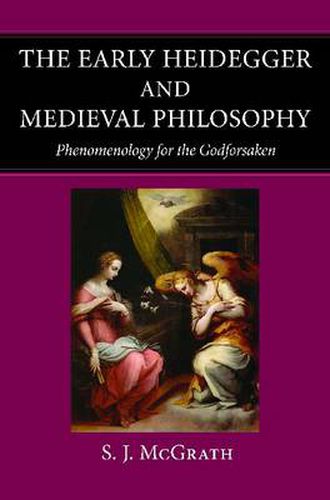Readings Newsletter
Become a Readings Member to make your shopping experience even easier.
Sign in or sign up for free!
You’re not far away from qualifying for FREE standard shipping within Australia
You’ve qualified for FREE standard shipping within Australia
The cart is loading…






The Early Heidegger and Medieval Philosophy is a major interpretive study of Heidegger’s complex relationship to medieval philosophy. S. J. McGrath’s contribution is historical and biographical as well as philosophical, examining how the enthusiastic defender of the Aristotelian-Scholastic tradition became the great destroyer of metaphysical theology.
This book provides an informative and comprehensive examination of Heidegger’s changing approach to medieval sources–from the seminary studies of Bonaventure to the famous phenomenological destructions of medieval ontology. McGrath argues that the mid-point of this development, and the high point of Heidegger’s reading of medieval philosophy, is the widely neglected habilitation thesis on Scotus and speculative grammar. He shows that this neo-Kantian retrieval of phenomenological moments in the metaphysics of Scotus and Thomas of Erfurt marks the beginning of a turn from metaphysics to existential phenomenology. McGrath’s careful hermeneutical reconstruction of this complex trajectory uncovers the roots of Heidegger’s critique of ontotheology in a Luther-inspired defection from his largely Scholastic formation.
In the end McGrath argues that Heidegger fails to do justice to the spirit of medieval philosophy. The book sheds new light on a long-debated question of the early Heidegger’s theological significance. Far from a neutral phenomenology, Heidegger’s masterwork, Being and Time, is shown to be a philosophically questionable overturning of the medieval theological paradigm.
$9.00 standard shipping within Australia
FREE standard shipping within Australia for orders over $100.00
Express & International shipping calculated at checkout
The Early Heidegger and Medieval Philosophy is a major interpretive study of Heidegger’s complex relationship to medieval philosophy. S. J. McGrath’s contribution is historical and biographical as well as philosophical, examining how the enthusiastic defender of the Aristotelian-Scholastic tradition became the great destroyer of metaphysical theology.
This book provides an informative and comprehensive examination of Heidegger’s changing approach to medieval sources–from the seminary studies of Bonaventure to the famous phenomenological destructions of medieval ontology. McGrath argues that the mid-point of this development, and the high point of Heidegger’s reading of medieval philosophy, is the widely neglected habilitation thesis on Scotus and speculative grammar. He shows that this neo-Kantian retrieval of phenomenological moments in the metaphysics of Scotus and Thomas of Erfurt marks the beginning of a turn from metaphysics to existential phenomenology. McGrath’s careful hermeneutical reconstruction of this complex trajectory uncovers the roots of Heidegger’s critique of ontotheology in a Luther-inspired defection from his largely Scholastic formation.
In the end McGrath argues that Heidegger fails to do justice to the spirit of medieval philosophy. The book sheds new light on a long-debated question of the early Heidegger’s theological significance. Far from a neutral phenomenology, Heidegger’s masterwork, Being and Time, is shown to be a philosophically questionable overturning of the medieval theological paradigm.